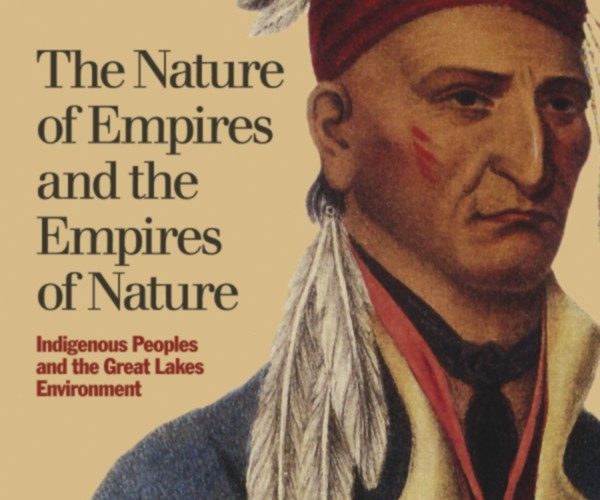Indigenous perspectives and academic methods are brought together in conversation in The Nature of Empires and the Empires of Nature: Indigenous Peoples and the Great Lakes Environment. This collection of essays, edited by Karl S. Hele, explores the British, American and French empires’ unsuccessful attempts to exert control over nature and Indigenous Peoples.
Indigenous perspectives and academic methods are brought together in conversation in The Nature of Empires and the Empires of Nature: Indigenous Peoples and the Great Lakes Environment. This collection of essays, edited by Karl S. Hele, explores the British, American and French empires’ unsuccessful attempts to exert control over nature and Indigenous Peoples. It also addresses contemporary issues facing Indigenous Peoples and the Great Lakes’ environment, demonstrating that indigenous knowledge must be taken seriously in order to advance environmental debates. The book engages with oral histories, storytelling, and the disciplines of history, education, literary studies and the social sciences. In doing so, numerous chapters raise important methodological debates and provide different perspectives which result in a lesson in intercultural dialogue for the Great Lakes region. This regional focus is exciting as it reconceptualises the area in accordance with environmental boundaries. However, the collection could have included more studies on the American side of the basin. Also, the breadth of this collection makes it overly ambitious. This is perhaps due to its origin as an academic conference that was inspired by the work of esteemed historian John MacKenzie.
Maureen Riche highlights what I believe to be the most important lesson in this collection for general readers: one must be reflexive, introspective and self-critical. Riche’s meditation on her experience spaying dogs for an NGO in the Kashechewan First Nation community results in her speculating that race, insider/outsider status, and spatial segregation were to blame for the assignment’s failure. This reflexivity leads Riche to consider the importance of history – by including excerpts of elders’ stories she considers perspectives other than her own, a lesson that can benefit everyone.
Jon Johnson challenges a common assumption: that “Indigenous culture is incompatible with urban environments.” He does so by showing how the Great Indian Bus Tour uses the storytelling tradition to reinforce connections between First Nations Peoples and land in the Greater Toronto Area. While Johnson combats urban stereotypes, Lianne C. Leddy challenges the commonly held notion that the north equals pristine wilderness. Although Serpent River is in the “wilds” of Northern Ontario, Leddy uncovers the social and environmental destruction of the river’s ecosystem caused by Algoma’s uranium mining industry. This damage is revealed through First Nation’s oral histories. Narrative can also merge with literary history methods as David T. McNab demonstrates in his analysis of teacher and missionary Ezhaaswe’s (William A. Elias) journals.
This collection is particularly good at bringing chapters with varying perspectives into conversation with one another. Brian Rice argues that some schools are guilty of cognitive imperialism because their Native Studies Programs marginalize Indigenous knowledge by focusing on anthropology and law. Devaluing Indigenous knowledge in Native Studies Programs is startling, but scholars working outside of this field, including Heather Marie Annis, Alesha Jane Breckenridge, Lori-Beth Hallock, Christianne V. Stephens and Regna Darnell, are incorporating Indigenous perspectives into their research in order to construct a more thoughtful understanding of contemporary and historical issues. For example, anthropologists Stephens and Darnell collaborate with the First Nations of Walpole Island to comprehend linked environmental and health concerns.
Hele’s The Nature of Empires and the Empires of Nature is not an introductory guide to Indigenous and environmental issues as they relate to empire; rather, it is a detailed and specific collection of essays meant to supplement more general sources. But, by bridging Indigenous and academic perspectives and forging connections between past and present social and environmental issues, this volume will be of interest to those concerned with the connection between colonialism, environment, and indigeneity.
The Nature of Empires and the Empires of Nature: Indigenous Peoples and the Great Lakes Environment, Karl S. Hele, (ed.) Waterloo: Wilfrid Laurier UP, 2013, 372 pages
Reviewer Information
Alec Follett is an enthusiastic birdwatcher whose PhD research, at uGuelph, explores the crossroads of environmental knowledge and environmental justice in Ontarian literature.













